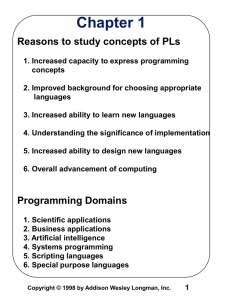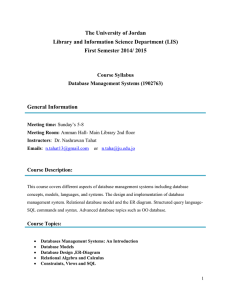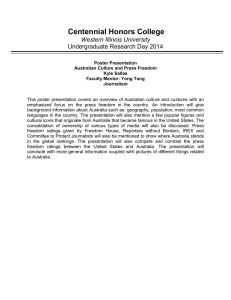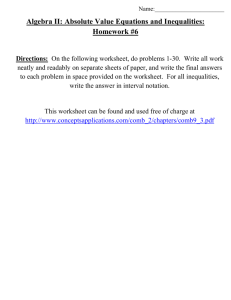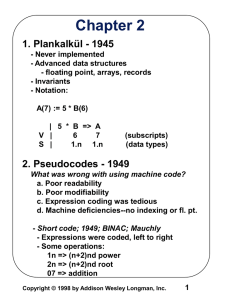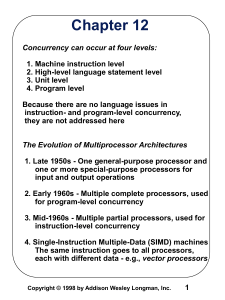How can I help my child with reading? Phase 1
advertisement
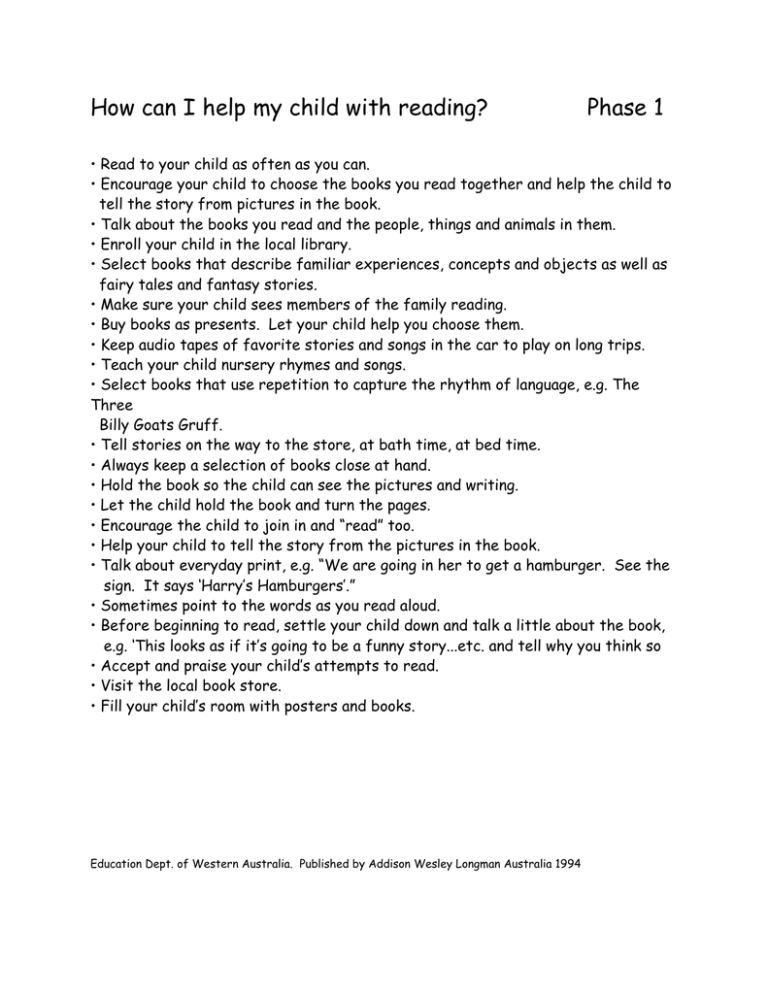
How can I help my child with reading? Phase 1 • Read to your child as often as you can. • Encourage your child to choose the books you read together and help the child to tell the story from pictures in the book. • Talk about the books you read and the people, things and animals in them. • Enroll your child in the local library. • Select books that describe familiar experiences, concepts and objects as well as fairy tales and fantasy stories. • Make sure your child sees members of the family reading. • Buy books as presents. Let your child help you choose them. • Keep audio tapes of favorite stories and songs in the car to play on long trips. • Teach your child nursery rhymes and songs. • Select books that use repetition to capture the rhythm of language, e.g. The Three Billy Goats Gruff. • Tell stories on the way to the store, at bath time, at bed time. • Always keep a selection of books close at hand. • Hold the book so the child can see the pictures and writing. • Let the child hold the book and turn the pages. • Encourage the child to join in and “read” too. • Help your child to tell the story from the pictures in the book. • Talk about everyday print, e.g. “We are going in her to get a hamburger. See the sign. It says ‘Harry’s Hamburgers’.” • Sometimes point to the words as you read aloud. • Before beginning to read, settle your child down and talk a little about the book, e.g. ‘This looks as if it’s going to be a funny story...etc. and tell why you think so • Accept and praise your child’s attempts to read. • Visit the local book store. • Fill your child’s room with posters and books. Education Dept. of Western Australia. Published by Addison Wesley Longman Australia 1994 Phase 2 • Read to your child whenever you can. Now and again ask a few ‘why’ questions about the story as you read. • Talk about the characters, plots, and settings of stories. • Discuss information gathered from factual books. • Enroll your child in the local library. Choose books together. • Talk about reading the newspaper, magazines and books, and why you enjoy them. • Encourage your child to try and write his/her own name in books he/she owns. • Read books of children’s poetry with your child. • Borrow ‘book and tape’ sets from the library. • Compare events and people with your own lives. • Talk about the pictures when reading to your child. • Take books with you when visiting. • Draw attention to print on packages, jars, etc., pointing to it as you say it. • Let your child ‘read’ to you, the cat, or the neighbors. • Encourage the child to join in when reading familiar stories. • Talk about everyday print. Discuss advertisements and talk about how they affect you. • Point out interesting or long words in books. • Accept your child’s efforts without criticism. Always encourage and praise his or her efforts. • Print your child’s name while the child watches when labeling lunch box etc. • Read birthday cards with your child, pointing to the words. • Write shopping lists in front of your child and talk about what you are doing. • Encourage your child to find words that begin with the same letter as his/her name. • Recognize letters on car license plates. • Watch and talk about television with your child. Use the captions for the hearing impaired during TV shows. • Encourage your child to look at the title and cover of a book and guess what it may be about. Ask them to tell you what makes them think so. • Encourage your child to tell the story from the pictures in the book. Education Dept. of Western Australia. Published by Addison Wesley Longman Australia 1994. Phase 3 • Continue to read to your child every day. Vary the type of books read, e.g. short stories, poems, or series chapter books. • When reading to your child stop sometimes and ask ‘What do you think might happen next?’ Accept the child’s answers even though they may not seem right. • Occasionally ask some ‘why’ questions about the story, e.g. ‘Why do you think the author put that part in the story?’ • Talk about books your child has read at school. • Take your child to the local library regularly and to any story telling sessions that are offered. • Buy books as presents to commemorate special occasions. • Talk about the things you read -- newspapers, magazines, books etc. • Browse together in book stores. • Talk about books you are reading together. Compare characters with real people. • Talk about illustrations to see if they match what is in the child’s or your mind. • Point out the author’s name before reading a book and encourage your child to read other books by that author. • If your child makes a mistake when he or she is reading aloud, allow time for selfcorrection. If the mistake makes sense, ignore it. • Buy your child games that provide simple instructions to read and follow. Play word games. • Encourage your child to make up plays for the family, acting out stories. Some children like to write simple scripts and to draw up a plan for other children to follow. • Share letters and postcards from friends with the whole family. • Encourage children to retell stories. Involve the family in starting a made up story and have each member add something new. • Encourage your child to write messages to other family members, letters, postcards, lists etc. Accept spelling mistakes. Education Dept. of Western Australia. Published by Addison Wesley Longman Australia 1994. Phase 4 • Continue reading to your child. • Include humorous books when selecting books to read. Encourage your child to make up jokes or riddles, or humorous stories. • Encourage your child to go to the local library regularly. • Make sure you read some of the books your child enjoys so that you can share reactions and pleasure together. • Ensure that your child knows that you value and enjoy reading yourself. • Encourage your child to draw and write about books and to write stories of factual information for others to read. • Encourage your child to read to younger brothers and sisters. • Read books that have been made into films or videos and encourage your child to talk about the differences between the books and the video or film. • Ask your child what word would make sense when he/she becomes ’stuck’ on a word. Encourage your child to read on, then come back to reread to get the overall meaning. • Discuss favorite authors together and decide why you like them. • Encourage your child to enter competitions in the local newspapers or magazines. • Encourage your child to make up, and perform, plays for the family, using their own and other stories. Have them write simple scripts to perform. • Encourage your child to keep a diary or journal when on holiday. This is particularly valuable if you are traveling and the child is missing school. Education Dept. of Western Australia. Published by Addison Wesley Longman Australia 1994. Phase 5 • Ensure your child is exposed to a wide range of reading materials, i.e. newspapers, letters, recipes, TV guides, magazines, puzzle books, comics, brochures, advertisements. etc. • Make sure your child uses the library regularly and encourage him/her to take younger children along. • Encourage your child to read for different purposes, i.e. - reading biographies and novels - reading and explaining instructions for using new appliances, games, technology etc. - reading interesting articles from the newspaper - reading to a younger brother or sister - reading to find out more information about a topic he/she is interested in • Take an interest in books written by favorite authors. Talk about them. Give them for presents. • Encourage your child to talk about books he or she has enjoyed or disliked. Foster thoughtful criticism and comment. • Let your child see that you sometimes need to discuss and clarify issues to help your understanding. • Continue to discuss ideas, statements and underlying beliefs evident in newspapers, books and TV programs. Phase 6 • Look for opportunities to discuss and share excerpts and ideas from a variety of different reading materials. • Value your own reading and be informed by that of you child. • Recognize that both you and your child may have quite different ideas about what you want to read and respect choices made. Broaden reading experiences by exchanging books. Education Dept. of Western Australia. Published by Addison Wesley Longman Australia 1994.
